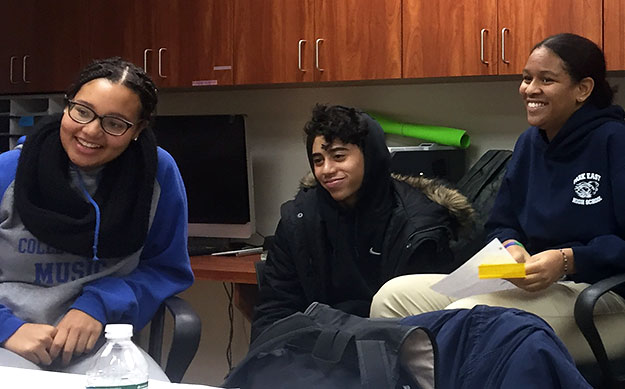
By Yara Palin
A group of high school students gather at 1970 Adam Clayton Powell Jr. Blvd in Harlem after class. On the second floor, they sit in a room with three PC’s, a Mac and bins loaded with condoms. It seems like every teenager’s ideal wreck-room, but the dry erase calendar on the wall shows that these teenagers are hard at work.
They are a part of a Community Healthcare Network’s (CHN) division that offers sexually transmitted infection (STI) and birth control education and resources for young adults ages 10-21. CHN has 12 clinics across four boroughs and the teens are a part of the Teens P.A.C.T. Program in Harlem which is designed to encourage sexual health among young people, regardless of whether or not they choose to be sexually active. Though their main goal is to avert pregnancy, sexually transmitted infections, and HIV among NYC adolescents, the teens want to influence their peers and community on a number other issues.
On a Wednesday afternoon that was far too cold to be early December, the room at 1970 and Adam Clayton Powell Jr. Boulevard was packed. The peer educators, as is their title, were having a passionate session on mass incarceration. Kimberly Martinez, 17, said “[Harvey] Weinstein abused all those women and he’s probably not going to jail for it, but black people go to jail for nonviolent crimes.” The conversation quickly shifts from the Netflix documentary “13” to Norwegian mass murderer Anders Breivik protesting his “cushy” prison cell.
The Teens P.A.C.T.’s primary objective is preventing unplanned pregnancies among teenagers. A Centers for Disease Control report discovered over 25 percent of new HIV infections in the U.S are in young people between the ages of 13 and 24. The same research found that more than half of young people who become infected do not know about their status because HIV tends to be asymptomatic.

According to Ana Jurado and Emmanuel Garcia, both 17 and seniors in high school, many teens merely lack access to information about contraceptives and where to get them. Even when they do have this access to this information, Jurado says, they’re scared of being judged for going to these kind of clinics. “There’s no shame in wanting to protect themselves,” she says. “Teens need to know that.” Garcia is motivated by the change he sees in his friends. “More and more, my friends understand that it’s okay to get help when you need it or even before you need it,” he says.
To address these issues, Teens P.A.C.T. has several public service announcements. The videos, which can be seen on its YouTube channel “More Than Just Sex,” are written and produced by the peer educators. Sometimes they even act in them. The campaign is completely designed by the peer educators so that every video will accurately and realistically reflect the conflicts that teenagers face.
The video series promotes the idea that young people can explore their own attitudes and beliefs around unplanned pregnancies, STIs, HIV, relationships, discrimination and peer pressure. The PSAs are often open-ended and finish with cliffhangers that are meant to be followed by conversations and activities that delve deeper into the issues they raise. The PSAs cover issues that range from the importance of contraception, self-confidence, planning ahead, and LGBTQ+ acceptance. In one clever PSA, a homophobic student-athlete finds himself knocked into an alternate universe where he is the minority, surrounded by students who all identify as LGBT. Another one, about the dangers of unprotected sex, parodies pharmaceutical advertisements that warn against a long list of side-effects.

Family physician Jean-Etienne Thibaud says that the videos are “on-target with their audiences, factual and give an important medical message about pregnancy and disease prevention to adolescents.” She also says that she uses the videos when educating her teenage patients to create a more comfortable atmosphere.
The peer educators make two public service announcements a year and the latest series of PSAs is set to premiere in May 2018, during the annual Teens P.A.C.T More Than Just Sex conference. The next conference will take place on May 6th, 2018, at St. Francis College in Brooklyn. The conferences are free and open to the public. The peer educators present interactive and informative lessons that help to build strong youth advocates, fortify leadership skills, and encourage strong professional and communal relationships. Details about the 2018 conference are still being worked out, but just last year renowned sexologist Michelle Hope was the keynote speaker.
For Jadriana Ferreira, Jasmely Colon, Ana Jurado and Emmanuel Garcia, it will be their last conference because they will all graduate high school and start college in the fall. Liza Hernandez, a 17-year-old peer educator, says that although they are mainly advocates for safe sex, she “looks up to” her older peers for how they’ve balanced working with school and filling out college applications. “We’re a community too and in my community I look up to the women of color that are my age,” she says. “Things like applying to college can be hard and seeing you guys doing it helps someone like me and just you guys being here makes a difference.”



